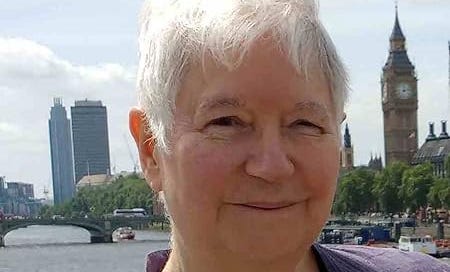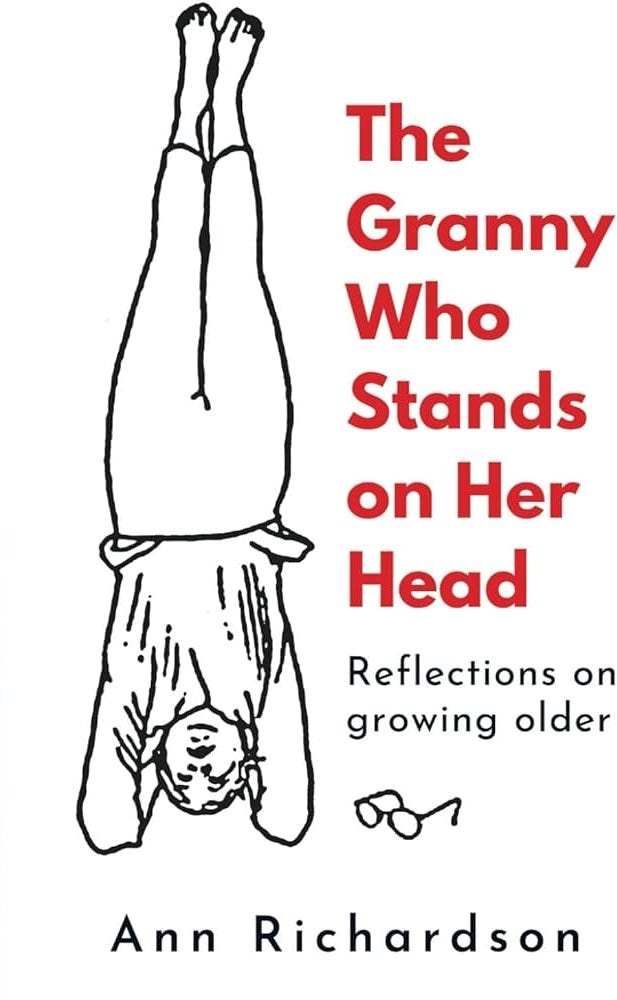On savoring old age, writing, and sex at 82
A Q&A with Ann Richardson on the pleasures of more confidence and the annoyance of less energy.
Introducing… ElderStack
Given the response and interest from a number of old(er) women writers and readers, including
, I’ve created a discussion space for [B]old Women that I’m now calling ElderStack. If you are a woman in your 60s, 70s, 80s, please introduce yourself! Younger women welcome welcome, also. - Debbie“Somewhere in the middle of my seventies, I realised that I liked being old… I am now 82 and I haven't changed my mind. A few things get harder but a surprising lot of things get easier.“ -
Q&A with [b]old woman Ann Richardson
Today I’m bringing you another Q&A with a [b]old woman writer. I met
on a post by , as we replied to one another in the comments1 ; one of several such “meet-cute” encounters I’ve had on Substack, and one of the things I love most about this platform. I was intrigued with Ann’s forthright statement about old age. She wrote, “I do genuinely like being old (I turn 82 in three days) for the confidence it has brought me and a lot of other things… “ It’s a bit unusual for someone to say they truly “like” old age in our youth-obsessed societies. What were the “other things,” I wondered? (I’ve reflected myself on the topic of adventures in old age, but Ann is a decade ahead of me and I hoped she’d have some revealing answers, or at least food for thought.) Luckily, she agreed to sit down and answer questions about her life as a writer, as a woman who has been married for 60 years, about her upbringing in the U.S. and her now permanent home in the UK with her British husband, and about her experience as The Granny Who Stands on her Head2, the name of her Substack and also the title of her most recent book3. I hope you enjoy reading this as much as I enjoyed the back-and-forth emails with Ann for our Q&A. And I hope you’ll meet me in the comments at the end, with your own questions for Ann or about old age.DW: You say in the description of your Substack that you’re writing about “living and dying.” What are your thoughts about death and dying?
AR: I first became interested in dying when I met a gay man, age 30 or so, living with AIDS back in the late 1980s, when AIDS was incurable. As we were becoming good friends, I wondered how I should treat someone with so little time left. After some thought, I concluded that I should treat him in the same way I treated anyone else. I spent a lot of time with him, including on the day he died. We had some good times together – he was smart and very deep.
He and I ended up writing a book together about people with AIDS, called Wise Before their Time4. Published in 1992 after he died, it still sells but not hugely. Ian McKellen5 wrote a Foreword, in which he said that it was “as powerful as any classic of fiction”. Needless to say, I liked that.
After my friend died, still interested in death, I volunteered in a hospice for four years. I loved doing it and was fascinated by how the nurses and others managed to go to work every day to help dying people. I ended up writing another book, Life in a Hospice, based on interviews with the staff in two hospices (nurses, doctors, managers and even a very reflective cook). I still find it fascinating. So, I have had a lot of experience of death and dying through these activities, but it still remains as much of a mystery for me as for everyone else. On Substack, I have written about how people who are dying can often wait for some key event, how I would want to approach dying, whether we would like to know when we are going to die, and, recently, being present when a fellow choir member had a heart attack.
The deaths I think about most, of course, are those of myself (age 82) and my husband (age 83), because we are in the years where death could happen any time. We both sort-of guess that he will die first, both because that’s what statistics tell us and he has more health problems, but of course you never know. Being left to fend on our own, without the support of the other, is a huge fear for both of us, as well as living any period of time with serious disability, particularly dementia. I once described our situation – the same for all old people – as walking around with a block of concrete over your head6, never knowing when it would fall. But there’s nothing much we can do but live enjoyable lives until we can’t.
DW: You’ve said that you like being old. That’s a somewhat unusual statement in our youth-obsessed societies. Tell us three things that you are enjoying or even savoring about old age.
![[B]OLD AGE with Debbie Weil](https://substackcdn.com/image/fetch/$s_!i8Z0!,w_80,h_80,c_fill,f_auto,q_auto:good,fl_progressive:steep,g_auto/https%3A%2F%2Fsubstack-post-media.s3.amazonaws.com%2Fpublic%2Fimages%2Fdaaca764-d8d6-4a1b-bf58-61dbb72810fc_842x842.png)
![[B]OLD AGE with Debbie Weil](https://substackcdn.com/image/fetch/$s_!fEcd!,e_trim:10:white/e_trim:10:transparent/h_72,c_limit,f_auto,q_auto:good,fl_progressive:steep/https%3A%2F%2Fsubstack-post-media.s3.amazonaws.com%2Fpublic%2Fimages%2F95ad4442-e435-4ebc-a8d2-9c9b89a8bdb6_2100x400.png)

![[B]OLD AGE with Debbie Weil](https://substackcdn.com/image/fetch/$s_!i8Z0!,w_36,h_36,c_fill,f_auto,q_auto:good,fl_progressive:steep,g_auto/https%3A%2F%2Fsubstack-post-media.s3.amazonaws.com%2Fpublic%2Fimages%2Fdaaca764-d8d6-4a1b-bf58-61dbb72810fc_842x842.png)



